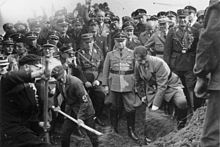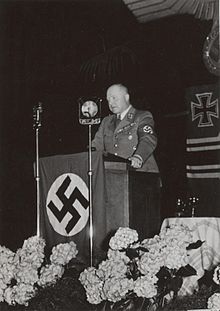Jakob Sprenger (politician)

Jakob Sprenger (born July 24, 1884 in Oberhausen near Bergzabern; † May 7, 1945 in Kössen ) was a German National Socialist politician and Gauleiter in the Hessen-Nassau district .
Life
Sprenger first attended elementary school and then the Progymnasium in Bergzabern . After graduating from high school, he served as a one-year military volunteer . From 1902 Sprenger was employed in the administration of the Reichspost . Sprenger took part in the First World War as a soldier . The postal inspector Jakob Sprenger became a member of the NSDAP in 1922 . After the NSDAP had been banned in the meantime, Sprenger belonged to the German Party and the Völkisch-Soziale Block in Frankfurt am Main and rejoined the NSDAP in August 1925 ( membership number 17.009).
The militant anti-Semite quickly made a career in the NSDAP. First he became Gauleiter of Hessen-Nassau -Süd in early 1927 . From September 1930 he was a member of the Reichstag of the Weimar Republic and then until the end of the war of the National Socialist Reichstag . From 1930 to 1933 he was a member of the administrative board of the Reichspost . On January 1, 1933, he was appointed Gauleiter of the new Hessen-Nassau Gau , which also included Hessen-Darmstadt.
On May 5, 1933, he was appointed Reich Governor of the People's State of Hesse and transferred the business of government to the previously elected President Ferdinand Werner (NSDAP), whom he, however, forced to resign on September 20, 1933 after a dispute over the merging of the Chambers of Commerce. On the basis of the Reich Governor Act of January 30, 1935 , Sprenger took over the leadership of the state government from his successor, Philipp Wilhelm Jung , two years later. Besides Martin Mutschmann , he was the only Reich Governor who was commissioned with this dual function. Sprenger held this dual function until the end of the war.
In 1933, Sprenger seems to have assumed a kind of spokesman function among the Gauleiters and Reichsstatthaltern for Adolf Hitler . However, at the end of the year, Sprenger fell in favor of the "Führer". The reasons for this are likely to have been the unrest surrounding Werner's removal and attempts to exert influence on neighboring states and NSDAP districts.
On September 1, 1939, the SA-Obergruppenführer Reich Defense Commissioner of the Military District XII in Wiesbaden , the cutting of the of the Gau Hessen Nassau differed considerably, in particular by the City of Frankfurt not to him but to the military district IX (Kassel) , led by Reich Defense Commissioner Fritz Sauckel , belonged. This conflict-prone situation was only ended on December 1, 1942, when the areas of the Reich defense districts were converted to the areas of the Parteigaue and Sprenger became Reich Defense Commissioner for his entire Parteigau. In the role of Gauleiter, he gave a speech in March 1941 at the opening of the pseudoscientific anti-Semitic institute initiated by Alfred Rosenberg to research the Jewish question in Frankfurt am Main. In 1944, based on the territories of the Reich Defense Districts and Gaue of the NSDAP, he was also appointed Chief President of the new Prussian Province of Nassau , with which the Hanau, Gelnhausen and Schlüchtern districts and the city of Hanau were withdrawn from the Kassel administrative district and Sprenger's state sphere of influence continued to be on the borders of the party structure was aligned.
In the night from 25 to 26 March 1945 fled Sprenger from the advancing US Army from Frankfurt to Kössen in Tyrol , where he on 7 May 1945 with his wife suicide committed.
In the Soviet zone of occupation , the Der Deutsche Beamte , which he published, were published . The plaything of the parties or the people's steward? (1932) and of him with Eugen Schmahl wrote evolution of nationalist movement. The anti-Semitic peasant movement in Hesse from the Böckel era to National Socialism (1933) was placed on the list of literature to be segregated .
Works
- Preface (with the title "Reichstatthalter") to Hermann Textor: Völkische Arbeitsseigung und Wirtschaftsstruktur. Ed. Research Institute for Work Design, for Aging and Consumption, Frankfurt. Wilhelm Limpert Verlag, Berlin 1939, p. 5.
literature
- Joachim Lilla , Martin Döring, Andreas Schulz: extras in uniform: the members of the Reichstag 1933–1945. A biographical manual. Including the Volkish and National Socialist members of the Reichstag from May 1924 . Droste, Düsseldorf 2004, ISBN 3-7700-5254-4 .
- Dieter Rebentisch : The Gau Hessen-Nassau and the National Socialist Reich reform. In: Nassauische Annalen 89. 1978, pp. 128-162.
- Peter Sander: Administration of the murder of the sick. The Nassau District Association in National Socialism , Psychosocial, Gießen 2003, ISBN 978-3-89806-320-3 (pdf; 1.1 MB) .
- Stephanie Zibell: Jakob Sprenger (1884–1945). Nazi Gauleiter and Reich Governor in Hesse. Edited by the Hessian Historical Commission Darmstadt and the Historical Commission for Hesse, Darmstadt 1999
Web links
- Literature by and about Jakob Sprenger in the catalog of the German National Library
- Newspaper article about Jakob Sprenger in the 20th century press kit of the ZBW - Leibniz Information Center for Economics .
- The Gauleiter Jakob Sprenger
- Jakob Sprenger in the database of members of the Reichstag
Individual evidence
- ↑ Jakob Sprenger in the database of members of the Reichstag
- ^ Peter Sander: Administration of the Sick Murder - The District Association Nassau in National Socialism , Gießen 2003, p. 742.
- ↑ a b Ernst Klee : The dictionary of persons on the Third Reich. Who was what before and after 1945 . Fischer Taschenbuch Verlag, second updated edition, Frankfurt am Main 2005, ISBN 978-3-596-16048-8 , p. 593.
- ^ Entry into force of the "Ordinance on the Reich Defense Commissioners and the Unification of Economic Administration" according to its Paragraph 22 on December 1, 1942, see Reichsgesetzblatt [1] , digitized at http://alex.onb.ac.at
- ↑ http://www.polunbi.de/bibliothek/1946-nslit-e.html
- ↑ http://www.polunbi.de/bibliothek/1947-nslit-b.html
- ↑ sic! Nazi word for retirement age
| personal data | |
|---|---|
| SURNAME | Sprenger, Jakob |
| BRIEF DESCRIPTION | German politician (NSDAP), MdR |
| DATE OF BIRTH | July 24, 1884 |
| PLACE OF BIRTH | Oberhausen (near Bad Bergzabern) |
| DATE OF DEATH | May 7, 1945 |
| Place of death | Kössen (Tyrol) |


